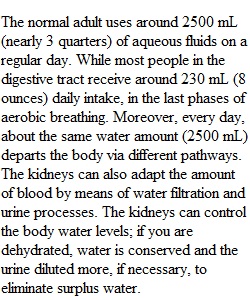


Q Unit 10: Discussion Pick 2 of the bulleted prompts below to write about in this week’s discussion. Unit 10 – Fluid/Electrolyte & Acid-Base Balance • Discuss normal body water content in the fluid compartments and electrolyte composition/movement between the fluid compartments. • Explain the regulation of water balance within the body. • Explain the roles and regulation of electrolytes and electrolyte balance within the body. • Explain the regulation of Acid-Base balance within the body. • Discuss 4 homeostatic imbalances of fluid and electrolytes and what is occurring physiologically in a person with the condition. ________________________________________________________________________ General Discussion Requirements Your initial response to the Prompt below should be posted no later than midnight on Day 4 of the academic week. Your input should be in your own words, demonstrating your understanding and comprehension of the topic. Copying and Pasting from the internet will result in a zero. It is expected that you will include both in-text and final references properly formatted in APA on all initial discussion postings. For help with this refer to the Academic Writer tab to the left of your screen. Then, I want to see you respond to your classmates in the middle of the week (try for Day 4, 5, or 6). The purpose here is to generate discussion to further explore the topics...ask questions, add insight, agree or disagree, etc. Of course, all discussion should be positive and professional. Do not complete all discussions requirements in one sitting; you should post in the discussion 3-4 different days throughout the week. If you have questions about this participation requirement, post them to the Course Questions Forum. Refer to the rubric/syllabus for a complete breakdown of the expectations.
View Related Questions